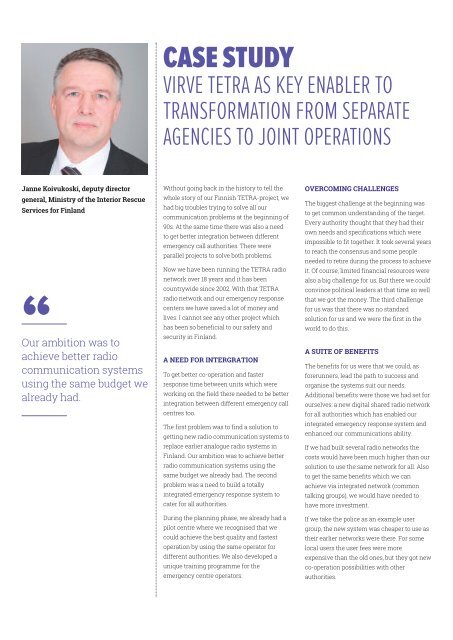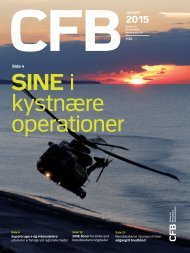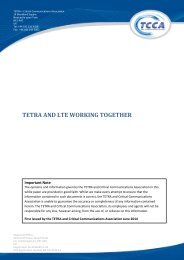CRITICAL COMMUNICATIONS CASE STUDY
6015BqJhc
6015BqJhc
You also want an ePaper? Increase the reach of your titles
YUMPU automatically turns print PDFs into web optimized ePapers that Google loves.
<strong>CASE</strong> <strong>STUDY</strong><br />
VIRVE TETRA AS KEY ENABLER TO<br />
TRANSFORMATION FROM SEPARATE<br />
AGENCIES TO JOINT OPERATIONS<br />
Janne Koivukoski, deputy director<br />
general, Ministry of the Interior Rescue<br />
Services for Finland<br />
“<br />
Our ambition was to<br />
achieve better radio<br />
communication systems<br />
using the same budget we<br />
already had.<br />
Without going back in the history to tell the<br />
whole story of our Finnish TETRA-project, we<br />
had big troubles trying to solve all our<br />
communication problems at the beginning of<br />
90s. At the same time there was also a need<br />
to get better integration between different<br />
emergency call authorities. There were<br />
parallel projects to solve both problems.<br />
Now we have been running the TETRA radio<br />
network over 18 years and it has been<br />
countrywide since 2002. With that TETRA<br />
radio network and our emergency response<br />
centers we have saved a lot of money and<br />
lives. I cannot see any other project which<br />
has been so beneficial to our safety and<br />
security in Finland.<br />
A NEED FOR INTERGRATION<br />
To get better co-operation and faster<br />
response time between units which were<br />
working on the field there needed to be better<br />
integration between different emergency call<br />
centres too.<br />
The first problem was to find a solution to<br />
getting new radio communication systems to<br />
replace earlier analogue radio systems in<br />
Finland. Our ambition was to achieve better<br />
radio communication systems using the<br />
same budget we already had. The second<br />
problem was a need to build a totally<br />
integrated emergency response system to<br />
cater for all authorities.<br />
During the planning phase, we already had a<br />
pilot centre where we recognised that we<br />
could achieve the best quality and fastest<br />
operation by using the same operator for<br />
different authorities. We also developed a<br />
unique training programme for the<br />
emergency centre operators.<br />
OVERCOMING CHALLENGES<br />
The biggest challenge at the beginning was<br />
to get common understanding of the target.<br />
Every authority thought that they had their<br />
own needs and specifications which were<br />
impossible to fit together. It took several years<br />
to reach the consensus and some people<br />
needed to retire during the process to achieve<br />
it. Of course, limited financial resources were<br />
also a big challenge for us. But there we could<br />
convince political leaders at that time so well<br />
that we got the money. The third challenge<br />
for us was that there was no standard<br />
solution for us and we were the first in the<br />
world to do this.<br />
A SUITE OF BENEFITS<br />
The benefits for us were that we could, as<br />
forerunners, lead the path to success and<br />
organise the systems suit our needs.<br />
Additional benefits were those we had set for<br />
ourselves: a new digital shared radio network<br />
for all authorities which has enabled our<br />
integrated emergency response system and<br />
enhanced our communications ability.<br />
If we had built several radio networks the<br />
costs would have been much higher than our<br />
solution to use the same network for all. Also<br />
to get the same benefits which we can<br />
achieve via integrated network (common<br />
talking groups), we would have needed to<br />
have more investment.<br />
If we take the police as an example user<br />
group, the new system was cheaper to use as<br />
their earlier networks were there. For some<br />
local users the user fees were more<br />
expensive than the old ones, but they got new<br />
co-operation possibilities with other<br />
authorities.




